
In August 2020, while families around the globe bemoaned the forced cancellations of their summer vacations thanks to the “Novel Coronavirus,” our family embarked on an exciting adventure. As others remained housebound, making the most of a very unusual summer, we were homeward bound, making Aliyah to enhance our spiritual quality of life and embrace our national identity.
But our “big move” from Woodmere to Ramat Beit Shemesh amid a pandemic was about more than returning to our roots. Having discovered a golden opportunity in the Negev, I was determined to help build the future of Israel – a brilliant national metamorphosis powered by rehabilitation.
A Yerushalmi by birth, I spent my childhood in the Shomron before my family moved to the United States. Years later, when it was time to plan our family’s triumphant return to Israel, we turned to Nefesh B’Nefesh for guidance regarding communities and employment. It was then we were introduced to the ADI Negev-Nahalat Eran Rehabilitation Village, an extraordinary community where people from diverse backgrounds and all levels of ability can live, heal and grow together.
As a Rehabilitation Physician specializing in Cancer rehabilitation, and Sports and Regenerative medicine, I was intrigued by the village’s plans to establish the first-ever rehabilitation hospital in Israel’s south. As a proud Israeli, I was excited by the prospect of helping bring quality care, housing and employment opportunities to the Negev. And as a devout Jew, I was overcome with pride when I heard about (and later witnessed) the acts of heroic humanity performed daily by the ADI staff and volunteers who care for and empower hundreds of children and young adults with severe disabilities.
I immediately recognized ADI Negev-Nahalat Eran (formerly ALEH Negev-Nahalat Eran) as the gold standard in rehabilitative care and Jewish responsibility, and I saw a chance to make my mark by providing the most underserved populations in Israel with the care and attention they deserve.
A year later, I not only stand by my decision but revel in it.
Having trained at the Memorial Sloan Kettering Cancer Center in New York, a host of top hospitals clamored to add me to their rosters. But it wasn’t until I arrived in the Negev that I knew I'd found my place and my purpose.
Here, I run the Inpatient Rehabilitation Unit, which serves adults with orthopedic and neurological disabilities, and our diverse yet cohesive family of medical and therapeutic professionals changes and saves lives with a proprietary blend of rehabilitation, research and respect. We not only provide state-of-the-art rehabilitation services previously nonexistent in southern Israel, but successfully keep families together throughout the process and promote empathy and acceptance by immersing them in the village’s uniquely inclusive environment.
Here, we successfully rehabilitate patients from all walks of life, and I’m making the kind of impact I had always envisioned.
For example, 50-year-old Yoni came to our neurological rehabilitation unit following a lower back decompressive surgery that eased pressure on his spinal nerves but necessitated serious rehabilitation. Following a thorough physical exam performed on admission, we suspected a higher level of spinal injury involving his upper back and assisted in his readmission to the hospital for an MRI, which determined the deeper source of his pain and weakness: a tumor pressing on his spinal cord. After the tumor was successfully removed, Yoni returned to the ADI Negev-Nahalat Eran inpatient unit, where he is successfully relearning how to walk.
Similarly, 19-year-old Ronit was diagnosed with Lymphoma in 2015, and the chemotherapy she received caused severe foot drops and issues with her fine motor coordination, rendering her immobile for more than a year. But after just four months at our inpatient rehabilitation unit, and continued care at our outpatient rehabilitation facility, Ronit is now able to walk and use her hands in ways she previously thought impossible following the extensive damage she sustained during cancer treatment.
While we’re exceedingly proud of our ability to fill the region’s major rehabilitation gap, cases like these point to a serious systemic issue. For far too long, our brothers and sister in the south have been an afterthought, relying on the resources in the center and the north of Israel for everything from retail to rehabilitation. But it’s time to change this narrative for good, and I hope to help write this new story.
Like the very first Israeli pioneers who transformed deserts and swamps into thriving woodland and beautiful neighborhoods, my colleagues and I see the social and medical oasis that is yet to be. Imbued with the power to recognize the potential in every person, we also see a bright economic future for the Negev and real opportunities to help our beloved homeland take giant leaps toward true inclusion, equity, access and quality care for all.
As recovery specialists, we believe that rehabilitation holds the keys to bridging the social divide and finally putting the Negev on the map. With the right mix of faith, hard work, partnership and mutual respect, the Negev, like our rehabilitation patients, will heal, grow stronger and put its best foot forward. And Israel will bloom like never before.
Dr. Shilo Kramer is a Physical Medicine and Rehabilitation specialist who immigrated to Ramat Beit Shemesh, Israel, from Woodmere, New York, and now serves as the Head of the Inpatient Rehabilitation Department at the ADI Negev-Nahalat Eran Rehabilitation Village (adi-israel.org), an expansive residential and rehabilitative complex in Israel’s south that is world renowned as a model of true inclusion.